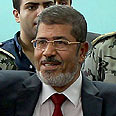
Mr. Morsi goes to Cairo
Op-ed: Islamist leader curbed by army won’t give up power easily, Egypt in for tumultuous times
In the 1939 classic “Mr. Smith goes to Washington,” a naïve junior senator confronts rampant corruption gripping American politics, only to be undermined by his fellow politicians to the point of exhaustion. While the Muslim Brotherhood’s Mohammed Morsi is hardly naive, his presidency has already been undermined by Egypt’s ruling military council (SCAF) - setting the stage for a far more dramatic political standoff.
As euphoria over Mr. Morsi’s anticipated win engulfed his supporters, Egypt’s generals completed a daring political maneuver with precision and cunning rarely witnessed on the battlefield. Once polls closed on Sunday night, it became apparent that the SCAF would amend Egypt’s interim constitution, adding an appendix which would substantially limit the governing ability of the incoming president. The move comes days after Egypt’s Courts dissolved the Islamist-dominated parliament in a ruling perceived as tainted with SCAF influence.
Related stories:
- Shafiq campaign claims victory in elections
Assuming Morsi indeed won, under the new configuration he will enter office stripped of his legislative backing, while forced to consult with the SCAF over any major political decision or appointment. Morsi will be unable to make decisions on foreign policy, nor flood government ministries with Brotherhood members without approval from the military. According to the SCAF, these measures will remain in place until the drafting of Egypt’s permanent constitution - which will likely take months to be completed.
Herein lies the key. Under the recent changes, the SCAF has assumed complete oversight over the formation of the constituent assembly, the body tasked with drafting Egypt’s new constitution. The makeup of this 100-member body has remained one of the most hotly contested issues of post-revolution Egypt, with Islamists, liberals and the military each vying to cement their influence over Egypt’s political future.

Election posters supporting Mohammed Morsi's candidacy (Photo: AFP)
For Islamists like the Muslim Brotherhood, control over the constitution would provide a vehicle to gradually mold Egypt’s government and society according to their religious ideology. The decision to field a presidential candidate was meant to compliment the power of the parliament, which until last week was tasked with forming the constituent assembly. By wresting away control over both the constitution and major presidential powers, the SCAF has left the Brotherhood’s leadership in a considerable predicament. Morsi now finds himself alone at the top, unable to implement the goals that the Brotherhood has pursued so patiently for decades.
Egypt change far from over
As the dust settles from victory celebrations on the streets of Cairo, the impact of the SCAF ploy has begun to sink in, enraging the Brotherhood’s many members as well as ordinary Egyptians. No stranger to being in the opposition, the Brotherhood must now decide how to exploit the people’s rage to regain control over the transition process, and the formation of Egypt’s constitution.
As the ultimate victim of the SCAF’s power-grab, Morsi may now stroll through Tahrir Square as the savior of Egypt’s stolen revolution. In leading the efforts to oppose the military council, he gains the opportunity to restore the admiration that his faction may have lost after its dismal performance in parliament.
The SCAF must now tread cautiously. The Brotherhood wields considerable protest infrastructure, able to incite mass demonstrations across the country on hours’ notice. They control multiple religious and civic institutions, including lawyers’ and teachers’ syndicates, enabling them to organize debilitating civil strikes. Most importantly, they boast the ability to foment instability that would isolate the SCAF and threaten its coveted Western military aid.
Indeed, Egypt’s transition process is far from over and tough times lie ahead for a nation already battered economically from months of political instability. Tahrir Square is already beginning to swell with hardcore revolutionary protesters, many of whom are digging in for the long haul. They will soon be joined by hordes of bearded youth bearing the green emblem of the Muslim Brotherhood - causing the blood pressure of Egypt’s generals to rise with each additional protester.
While the military council may have bloodied their nose, the Muslim Brotherhood is not down for the count. Their man, Morsi, may face an uphill battle upon entering the Presidential Palace - but he is no Mr. Smith. In confronting the SCAF, he brings with him the political stamina and patience of the Muslim Brotherhood, backed by the wrath of the Egyptian street.
The authors are intelligence managers at Max-Security Solutions, a geo-political risk consulting firm based in the Middle East










